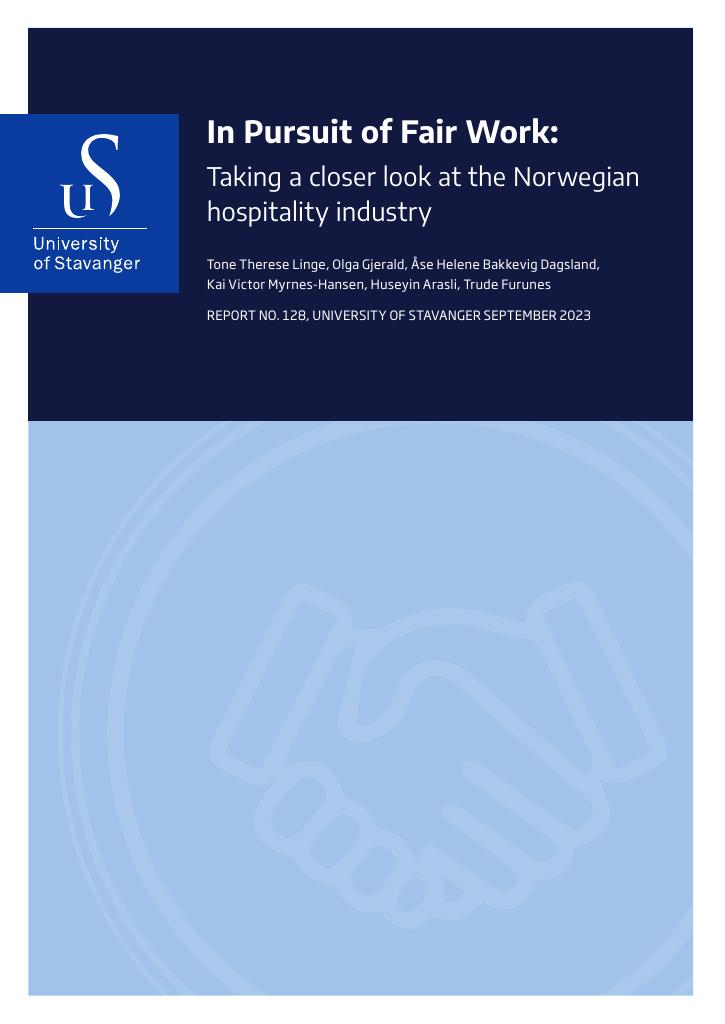Kartlegging
In pursuit of fair work : taking a closer look at the Norwegian hospitality industry
This report highlights the findings and implications of research conducted in the Norwegian hospitality sector during the Covid-19 pandemic. The report focuses on workers’ experiences in the industry, using the Fair Work Principles: fair contracts, fair pay, fair conditions, fair management, and fair representation. Similar surveys have been conducted among hospitality workers in Ireland, Scotland, Greece, Australia, and New Zealand. The Norwegian survey was conducted between September 2021 – March 2022 and generated 853 responses of which 585 were complete from workers in the Norwegian hospitality sector. The respondents varied in gender, age, nationality, role within the sector, contract type and length of service. The results, based on the five key Fair Work Principles, show that the Norwegian hospitality sector still has some work to do to ensure that all workers in the industry experience fair work. Employees in the Norwegian worklife have a strong formal employment protection due to the Working Environment Act (Working Environment Act, 2005), in addition to other laws and regulations. Over 90 % of the participants reported that they were on permanent contracts, either full-time or part-time. However, although Norway has strong rules and regulations concerning employee rights, the survey reveals shortcomings concerning the greyer areas such as a lack of opportunities for pay rise or promotion, workplace training, not getting the rest breaks that workers are entitled to, and uncertainty whether the workers received the correct overtime pay. Some of the most concerning findings in the Norwegian hospitality sector were related to fair conditions, where an alarmingly high number participants reported that they had either experienced or witnessed harassment, abuse and bullying in their workplaces. Most of the abuse came from customers, but many of the respondents also mentioned colleagues and supervisors/ managers as perpetrators of abuse, harassment and bullying. Furthermore, over 40 percent of those who stated that they had experienced or witnessed abuse, harassment or bullying in the workplace declared that they did not report it further due to different reasons such as that they did not know where to report, did not think that anything would be done, or that they were afraid of losing their job. Concerning fair management, a third of the participants stated that they did not feel as though they were treated with dignity and respect, or that they received supportive feedback from their managers. Only half of the participants reported that they had received some kind of training in their job. The findings indicate that the types of training and development opportunities offered to employees were largely dependent on the specific workplace. Ultimately, the findings highlight the following key areas for improvement in the Norwegian hospitality industry: Opportunities for pay rise and promotion Opportunities for training Cultural change: Working to change the industry specific culture of tolerating abuse and harassment among employees in the hospitality industry Management of staff: Increased respect and perceptions of being listened to and making a difference
Publisert
Eier
Universitetet i Stavanger
Forfattere
Tone Therese Linge, Olga Gjerald, Åse Helene Bakkevig Dagsland, Kai Victor Myrnes-Hansen, Huseyin Arasli og Trude Furunes
Språk
norsk (bokmål)
Kilde
ISBN
9788284391847
